Beomseok Lee
Speech Foundation Models and Crowdsourcing for Efficient, High-Quality Data Collection
Dec 16, 2024



Abstract:While crowdsourcing is an established solution for facilitating and scaling the collection of speech data, the involvement of non-experts necessitates protocols to ensure final data quality. To reduce the costs of these essential controls, this paper investigates the use of Speech Foundation Models (SFMs) to automate the validation process, examining for the first time the cost/quality trade-off in data acquisition. Experiments conducted on French, German, and Korean data demonstrate that SFM-based validation has the potential to reduce reliance on human validation, resulting in an estimated cost saving of over 40.0% without degrading final data quality. These findings open new opportunities for more efficient, cost-effective, and scalable speech data acquisition.
Speech-MASSIVE: A Multilingual Speech Dataset for SLU and Beyond
Aug 07, 2024



Abstract:We present Speech-MASSIVE, a multilingual Spoken Language Understanding (SLU) dataset comprising the speech counterpart for a portion of the MASSIVE textual corpus. Speech-MASSIVE covers 12 languages from different families and inherits from MASSIVE the annotations for the intent prediction and slot-filling tasks. Our extension is prompted by the scarcity of massively multilingual SLU datasets and the growing need for versatile speech datasets to assess foundation models (LLMs, speech encoders) across languages and tasks. We provide a multimodal, multitask, multilingual dataset and report SLU baselines using both cascaded and end-to-end architectures in various training scenarios (zero-shot, few-shot, and full fine-tune). Furthermore, we demonstrate the suitability of Speech-MASSIVE for benchmarking other tasks such as speech transcription, language identification, and speech translation. The dataset, models, and code are publicly available at: https://github.com/hlt-mt/Speech-MASSIVE
Decision Attentive Regularization to Improve Simultaneous Speech Translation Systems
Oct 13, 2021



Abstract:Simultaneous Speech-to-text Translation (SimulST) systems translate source speech in tandem with the speaker using partial input. Recent works have tried to leverage the text translation task to improve the performance of Speech Translation (ST) in the offline domain. Motivated by these improvements, we propose to add Decision Attentive Regularization (DAR) to Monotonic Multihead Attention (MMA) based SimulST systems. DAR improves the read/write decisions for speech using the Simultaneous text Translation (SimulMT) task. We also extend several techniques from the offline domain to the SimulST task. Our proposed system achieves significant performance improvements for the MuST-C English-German (EnDe) SimulST task, where we provide an average BLUE score improvement of around 4.57 points or 34.17% across different latencies. Further, the latency-quality tradeoffs establish that the proposed model achieves better results compared to the baseline.
Infusing Future Information into Monotonic Attention Through Language Models
Sep 07, 2021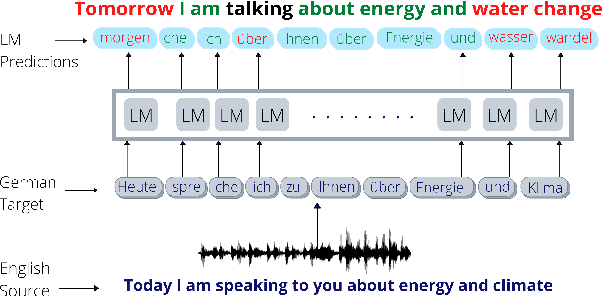


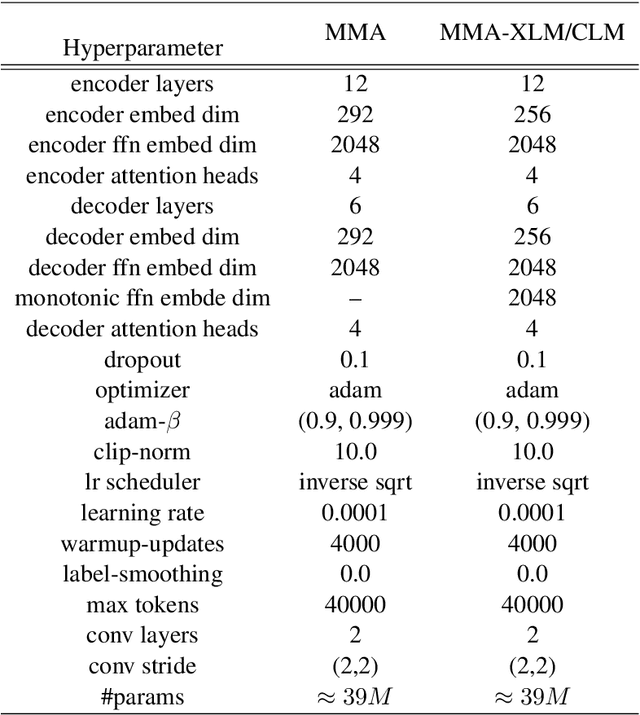
Abstract:Simultaneous neural machine translation(SNMT) models start emitting the target sequence before they have processed the source sequence. The recent adaptive policies for SNMT use monotonic attention to perform read/write decisions based on the partial source and target sequences. The lack of sufficient information might cause the monotonic attention to take poor read/write decisions, which in turn negatively affects the performance of the SNMT model. On the other hand, human translators make better read/write decisions since they can anticipate the immediate future words using linguistic information and domain knowledge.Motivated by human translators, in this work, we propose a framework to aid monotonic attention with an external language model to improve its decisions.We conduct experiments on the MuST-C English-German and English-French speech-to-text translation tasks to show the effectiveness of the proposed framework.The proposed SNMT method improves the quality-latency trade-off over the state-of-the-art monotonic multihead attention.
Faster Re-translation Using Non-Autoregressive Model For Simultaneous Neural Machine Translation
Dec 29, 2020

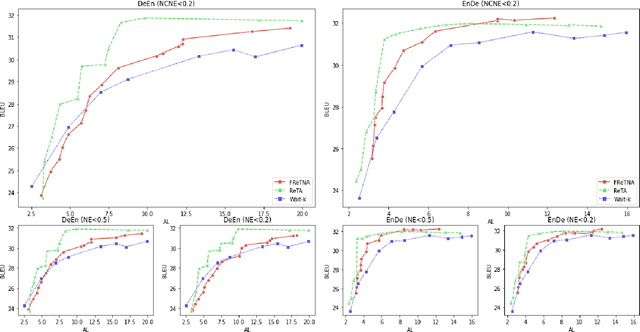
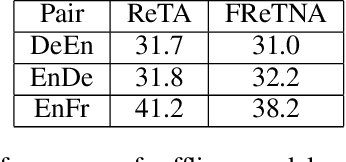
Abstract:Recently, simultaneous translation has gathered a lot of attention since it enables compelling applications such as subtitle translation for a live event or real-time video-call translation. Some of these translation applications allow editing of partial translation giving rise to re-translation approaches. The current re-translation approaches are based on autoregressive sequence generation models (ReTA), which generate tar-get tokens in the (partial) translation sequentially. The multiple re-translations with sequential generation inReTAmodelslead to an increased inference time gap between the incoming source input and the corresponding target output as the source input grows. Besides, due to the large number of inference operations involved, the ReTA models are not favorable for resource-constrained devices. In this work, we propose a faster re-translation system based on a non-autoregressive sequence generation model (FReTNA) to overcome the aforementioned limitations. We evaluate the proposed model on multiple translation tasks and our model reduces the inference times by several orders and achieves a competitive BLEUscore compared to the ReTA and streaming (Wait-k) models.The proposed model reduces the average computation time by a factor of 20 when compared to the ReTA model by incurring a small drop in the translation quality. It also outperforms the streaming-based Wait-k model both in terms of computation time (1.5 times lower) and translation quality.
Data Efficient Direct Speech-to-Text Translation with Modality Agnostic Meta-Learning
Nov 11, 2019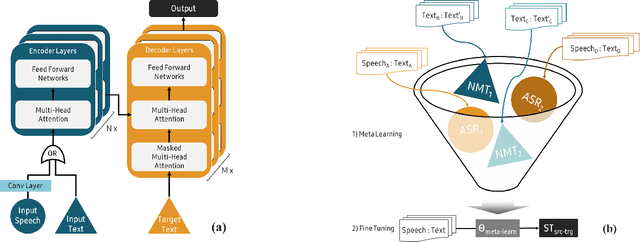



Abstract:End-to-end Speech Translation (ST) models have several advantages such as lower latency, smaller model size, and less error compounding over conventional pipelines that combine Automatic Speech Recognition (ASR) and text Machine Translation (MT) models. However, collecting large amounts of parallel data for ST task is more difficult compared to the ASR and MT tasks. Previous studies have proposed the use of transfer learning approaches to overcome the above difficulty. These approaches benefit from weakly supervised training data, such as ASR speech-to-transcript or MT text-to-text translation pairs. However, the parameters in these models are updated independently of each task, which may lead to sub-optimal solutions. In this work, we adopt a meta-learning algorithm to train a modality agnostic multi-task model that transfers knowledge from source tasks=ASR+MT to target task=ST where ST task severely lacks data. In the meta-learning phase, the parameters of the model are exposed to vast amounts of speech transcripts (e.g., English ASR) and text translations (e.g., English-German MT). During this phase, parameters are updated in such a way to understand speech, text representations, the relation between them, as well as act as a good initialization point for the target ST task. We evaluate the proposed meta-learning approach for ST tasks on English-German (En-De) and English-French (En-Fr) language pairs from the Multilingual Speech Translation Corpus (MuST-C). Our method outperforms the previous transfer learning approaches and sets new state-of-the-art results for En-De and En-Fr ST tasks by obtaining 9.18, and 11.76 BLEU point improvements, respectively.
 Add to Chrome
Add to Chrome Add to Firefox
Add to Firefox Add to Edge
Add to Edge